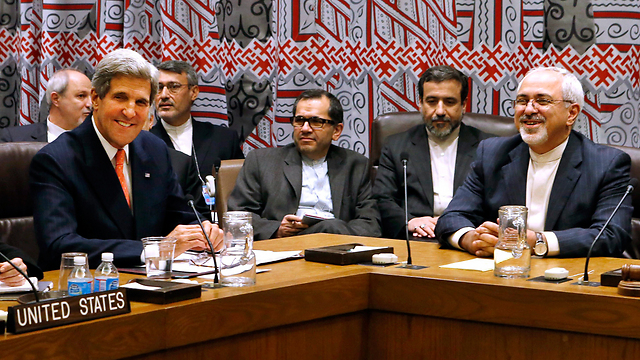Mark Dubowitz of the Foundation for Defense of Democracies claims that on paper, Iran is left with $50 billion, yet in practice Iran may have access to as little as $15 billion, that "may cover as little as three months of imports."
Related stories:
- On eve of Rohani inauguration, Iran's economic crisis worsens
- Peres: All options open on Iran
- Biden: Nuclear Iran dangerous to Israel
In any case, Iran is just a few months away from losing access to foreign currency, which would explain the great effort by President Hassan Rohani, with the approval of Ali Khamenei, to promote an agreement with the US and the West.
While Prime Minister Benjamin Netanyahu said to US President Barack Obama and administration officials that the sanctions against Iran must be increased since only an economic collapse will lead it to withdraw its nuclear program, the White House is concerned that increasing economic pressure at this time may weaken Rohani and strengthen hard-liners in Tehran.
The New York Times also wrote about Iran's great distress in regards to foreign currency, following the difficult sanctions posed by the Obama administration. The paper published interviews with dispirited Iranian businessmen, and quoted Western economists who believe that the breaking-point is closer than estimated in the past, and only a few months away.
Iranian media is reporting that the government owes billions of dollars to contactors, banks and municipalities across the country. In light of the sanctions, oil profits, which account for 80% of government revenue, were reduced by half.
Research performed by the New York-based Roubini Global Economics and the Washington-based Foundation for Defense of Democracies revealed that Iran's foreign currency has reduced in the last summer to $80 million. But three-quarters of this amount is deposited in third-country accounts that buy Iranian oil. Because of the hardening of the US sanctions, which took effect in February, the money can only be used to purchase products within these countries, and cannot be used to repay debts to Iran.
According to the New York Times, even gaining access to the remaining $20 billion is difficult – it has to be physically moved in cash because of Iran's expulsion from the global banking network known by its acronym Swift, which had allowed the money to be transmitted electronically. "They can't repatriate the money back to Iran," said Mark Dubowitz.
The result: Iranian businessmen cannot make transactions through banks and are forced to transfer suitcases of cash through street-level money changers to shady bankers abroad. This is not only costly, with middlemen exacting fees every step of the way, but also dangerous, the cash making a tempting target for thieves.
The New York Times writes lower-level officials and businesspeople are even more alarmed than the leadership, with some saying Iran's economy is already on the verge of collapse.
- Receive Ynetnews updates
directly to your desktop
















